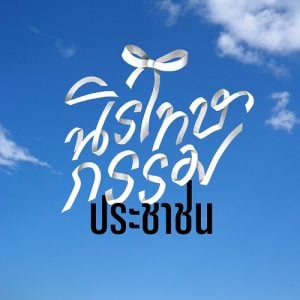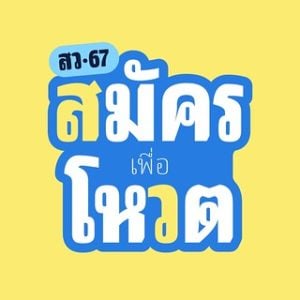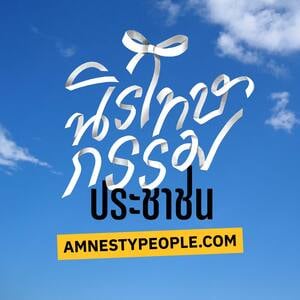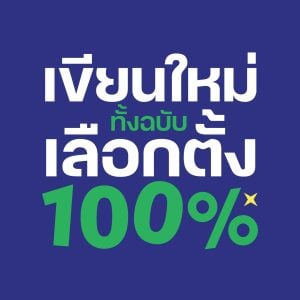There has been, on average, approximately over 100 political prisoners at each time during the NCPO regime. This shocking statistic is a direct result of the NCPO’s and the judiciary’s curtailment of freedom of expression liberties to suppress dissent against the ruling military establishment. For certain crimes, such as lese majeste, defendants face considerable risk in having their basic rights to bail violated. In addition, the living conditions of prisoners in Thailand are, to put it lightly, appalling.
According to former inmate Ekachai Hongkangwan, who was imprisoned on a lese majesteconviction, prisoners do not have adequate access to sufficient nutritional food, clothing, proper medical assistance, and comfortable sleeping conditions. Access to basic goods cannot be afforded by prisoners from lower socioeconomic backgrounds. Tight financial regulations are also enforced on all inmates. Each prisoner is allowed to hold up to 9,000 Baht (approximately 300 USD) in their account at any given time and daily expenditures are limited at up to 300 Baht (approximately 10 USD) a day. In addition, many political prisoners who were charged with national security offenses are unable to afford bail bonds given the disproportionately high level of bail that is set by the courts. This is clearly disproportionate given that the alleged offenses of political prisoners were merely an expression of their opinion.
To aid prisoners in affording bail bonds and basic living goods, there are three main organized funds in Thailand that provide financial support to political prisoners: the For Friends Association (FFA), a fund managed by human rights lawyer Anon Nampa, and the Access to Justice Fund for Political Prisoners in Thailand. To gain more information regarding the funds, iLaw conducted an in-depth interview with Ekachai Hongkangwan from the FFA, Anon Nampa, and the coordinator of the Access to Justice Fund who wished to remain anonymous.
For Friends Association (FFA) -supporting living conditions of political prisoners
FFA was found in 2016 by a group of activists including Piyarat Chongthep, a former student activist and Ekachai Hongkangwan, a former prisoner of conscience who served his sentence at the Bangkok Remand Prison. In our interview, Ekachai described his harrowing experience of living in the Bangkok Remand Prison under a lese majeste charge for 2 years and 8 months. The main income of the association is derived through a crowdfunding model. Since its inception until August 2017, FFA raised funds by crowdfunding twice and managed to provide support to 80 or 90 prisoners of conscience, most of its support is concentrated in two major prisons in Bangkok, the Bangkok Remand Prison and the Correctional Women’s Centre.
To ensure that prisoners of conscience can cope with the harsh living conditions of prison, FFA staff would be present at the prison to buy basic items such as clothes or shower kits for the prisoners of conscience whose liberty had been recently deprived. Ekachai explained that through his experience of prison, prisoners who have just entered the prison system have the most urgent need of support. Ekachai explained that after an individual had been arrested, his or her money will be confiscated by the authorities upon arrival at the prison. This confiscated money will be later processed and transferred into a prison account of the inmate. As this procedure could take several days, hence during this time the new inmate will not be able to purchase any basic goods. FFA will solve this savings shortage by providing basic goods so the prisoners of conscience so that the latter can better adjust themselves to live in prison.
Apart from providing support to the newly detained prisoner of conscience, FFA also provides support to the detainees who had been recently released. After prisoners of conscience are released, either they are granted bail or they had completed the serving of their sentence. FFA will support them by giving them 2,000 Baht (approximately 60 USD) which they can use to pay for their travel to return home. In addition, a factory that is owned by an FFA member also hires some prisoners of conscience who had been released to ensure that they are able to support themselves and their families’ post-incarceration. This is due to the discrimination faced by prisoners’ post-release in joining the labour force.

Moreover, the FFA also plays an important role in advocating for the rights of prisoners. The demands that it advocates (through a petition) to the Thai government on the website change.org include:
(1) allow prisoners to access the news on the television or through newspapers,
(2) provide beds and pillows to prisoners so they do not have to sleep on the uncomfortable cement floor of prisons cells,
(3) reduce the limit for the available deposit that can be received by prisoners. (The current deposit that can be received is 9000 Baht per month, which the FFA strongly believes is insufficient for basic standard of living), and
(4) remove the requirement that people who are not registered on the visitor list are not able to visit prisoners.
The FFA also advocates for better medical care for the prisoners. Currently, prisoners have infrequent and insufficient access to doctors and medication. In addition, the FFA has requested prisons to allow them to arrange for volunteers to teach inmates useful courses such as English. However, the prisons have not responded to these demands.
Fund run by Anon Nampa
Unlike the FFA, this fund is used to provide bail funds to detainees in freedom of expression cases that are have insufficient funds to use as bail bond. This fund is administered by Anon Nampa, a prominent human rights lawyer from Thai Lawyers for Human Rights (TLHR). It is used as a symbol to show the military junta that the struggle for justice and freedom is widely supported by the public.
The origins to the creation of the fund is when Anon and a few other political activists held an activity called ‘My Dear Election’ on 14 February 2015 to commemorate an election that was supposed to take place but was never held. year before. They were arrested for violating NCPO Announcement No. 7/2014 which banned political gatherings. Anon was further charged with violating the Computer-related Crimes Act as he made a Facebook post on his facebook about the symbolic action. The court demanded all defendants to deposit bail bond in total 500,000 Baht. Anon then called for financial support on his Facebook for the bail bond, and he received widespread support in his appeal as about 700,000 to 800,000 Baht was transferred to his bank account. Anon decided to use this strategy to fund raise the bail bonds of similar defendants to send a political message to the NCPO that their political struggle is supported by a large section of the Thai public.
The bank account that holds the fund has 3 signatories: Weeranan Huadsri, a human rights lawyer from TLHR, Ida Aroonwong Na Ayudhaya, the editor of Aan magazine, and Anon Nampa himself. These individuals were chosen for convenience and mobility as Ida is a guarantor for many freedom of expression defendants while Weeranan and Anon represented many defendants in such cases.
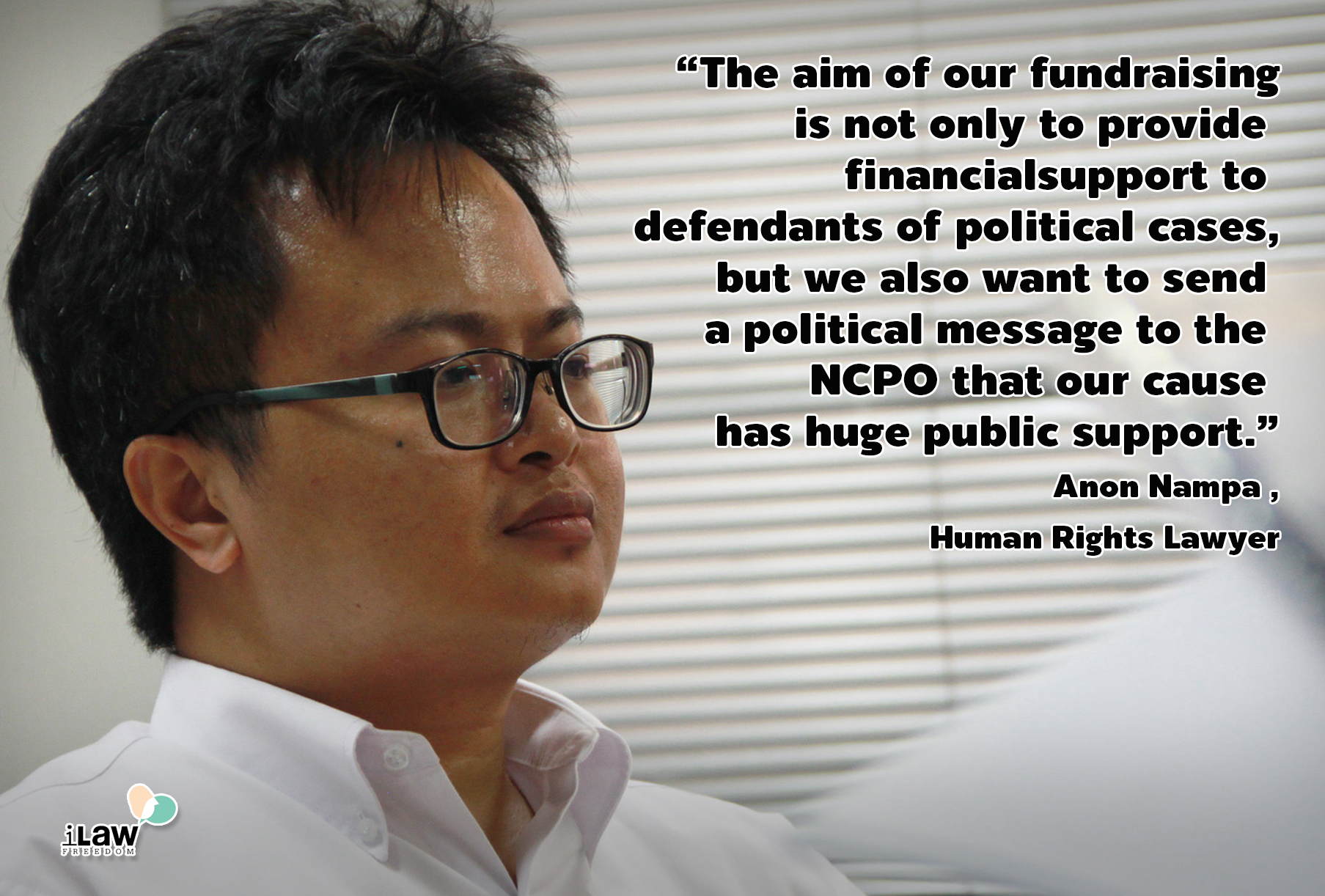
After discussing among the signatories about the need to provide funding support for a detainee. Anon would advertise the case on his personal Facebook account and ask his followers for a consensus about the need to provide financial support for each case. If Anon’s Facebook followers reach an agreement to support the defendants in question, they can deposit the money into this bank account. The physical presence of two out of the three signatories is required to make a withdrawal from this account. To ensure the financial transaction for this fund is transparent, Anon will post the bank account records of the fund on his Facebook account after a significant withdrawal or deposit has been made.
This fund is run on an ad hoc basis (cases by case) and is not a registered charity. The defendants that the fund supports are selected on a needs basis (ie priority is given to poorer defendants) and that the case must be a violation of the right to freedom of expression. The 10 cases that this fund has supported includes Thanakorn (charged with lese majeste after authoring a mocking message to the King), Linda (who accused that General Prayuth is involved in corruption), and the mother of Sirawith or Ja’ New, a young political activist (charged with lese majeste for replying ‘yes’ to a man she was conversing with on Facebook).
After the number of freedom of expression cases increased during the term of the NCPO, the amount of funds raised declined, most likely due to ‘compassion fatigue’. Thus, Anon altered his funding strategy by borrowing money from the public and repaying the loan once the bail bond has been returned to the detainee after the case is closed.
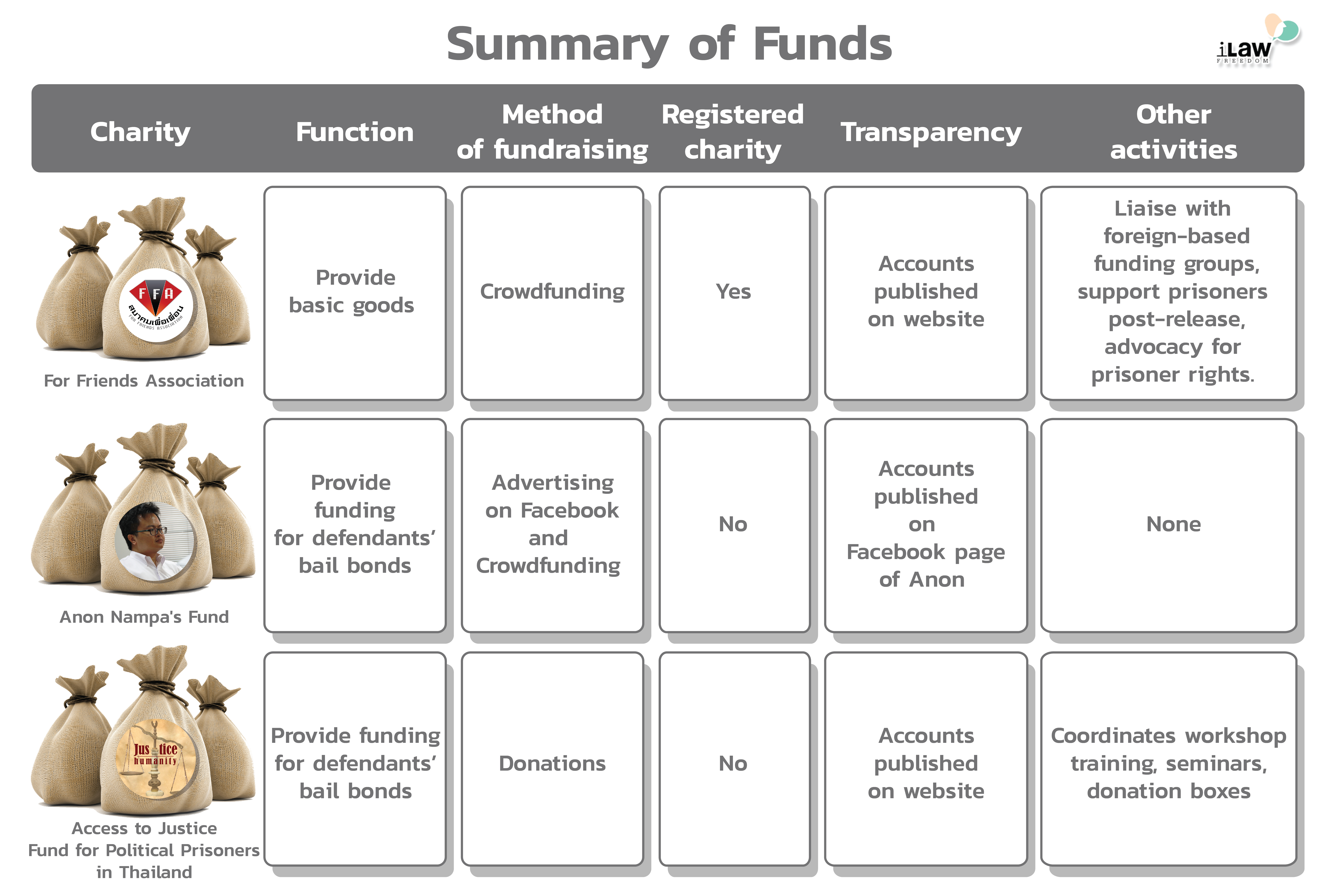
Comparison of Funds for Political Prisoners
Access to Justice Fund for Political Prisoners in Thailand
Similar to the fund run by Anon, this fund is also used to provide financial support for the defendant’s bail bond. However, a unique aspect about this fund is that it is also used to provide support to the family of the detainee and promote public awareness about political prisoners and the rights they have (for example, the right to bail).
This fund was formed by a group of peace activists who, after observing the political situation after the 2014 coup, became aware that many political prisoners did not enjoy
their rights to bail under the NCPO as they were not allowed to or because they did not have the financial resources. Moreover, many of these prisoners have a family that they are unable to support from prison.
The group has supported 4 political prisoners thus far. 3 of these prisoners have been released on bail while 1 prisoner has had its bail request rejected. The main funding source is from donations from political activist groups and other organizations from different backgrounds. The organization asks for donations at various seminars and meetings that it organizes.
The volunteers at the Access to Justice Fund tirelessly coordinates workshop training, seminars, donation boxes, and updating the organization’s Facebook page to keep the public informed. They are responsible for liaising with potential donors and responding to their queries at these events. As one of its funding sources, participants to the organization’s workshop training program will have to pay course fees. This training program, which is open to the public, trains participants on non-violence communication, self-development, and trauma rehabilitation.
The Access to Justice Fund believes in upholding transparency as their bank account records are accessible on its website. In addition, the organization will update its Facebook account every 2 to 3 months when there is a major update in their income of expenditure.
The organisation does not have any full-time staff. It consists entirely of part-time staff (just 1 since February 2017) and volunteers. This work structure means that it is difficult for the organization to organize fund-raising activities such as art auctions and film screenings. The fund has a Board of Directors that consists of members of society that has high social standing. The Board advises the fund organizers.
The existence of these funds and the public support for them show that sections of the Thai public have not given up on citizens whose rights have been stripped away by the NCPO. These political prisoners are victims of paranoia by the military elite who fear that the right to free expression will be used as a weapon of dissent against them. The humanitarian purpose of these funds plays a vital role in ensuring that the military junta’s culture of silence and the sanctions that are part of it will be ineffective.
.
RELATED POSTS
No related posts

